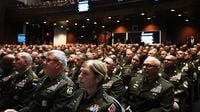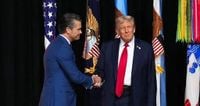On September 30, 2025, the usually tranquil Marine Corps Base in Quantico, Virginia, became the epicenter of a seismic shift in the U.S. military’s leadership culture. Hundreds of the nation’s top generals and admirals were summoned with little warning to hear Defense Secretary Pete Hegseth and President Donald Trump lay out an aggressive new vision for the armed forces—one that promises to upend decades of policy and tradition in the name of restoring what they called a "warrior ethos."
The gathering, described by ABC News and the Associated Press as both rare and abrupt, saw Hegseth rail against what he labeled "woke" culture in the ranks. "The era of politically correct, overly sensitive, don't-hurt-anyone's-feelings leadership ends right now," Hegseth declared, drawing a line in the sand for the assembled brass. He announced sweeping new directives: raising physical standards for all service members to a "male level," toughening grooming requirements, lifting restrictions on rules of engagement, eliminating racial quotas, and ending restrictions on hazing for boot camp recruits. "No more division, distraction or gender delusions," he said, in a speech that left little room for ambiguity—or dissent.
Hegseth, a former Army National Guard infantry officer with deployments to Guantanamo Bay, Iraq, and Afghanistan under his belt, didn’t mince words about the rationale behind these changes. "Simply put, if you do not meet the male level physical standards for combat positions, cannot pass a PT test or don't want to shave and look professional, it's time for a new position or a new profession," he said, according to ABC News. The new standards, he insisted, were not meant to exclude women, but to ensure that all who serve in combat roles meet the same demanding requirements. "If women can make it, excellent; if not, it is what it is. That is not the intent, but it could be the result," Hegseth clarified, as quoted by the Associated Press.
The atmosphere in the auditorium was tense. Trump, taking the stage after Hegseth, encouraged applause but also warned, "If you don’t like what I’m saying, you can leave the room — of course, there goes your rank, there goes your future." The military leaders, in keeping with tradition, sat mostly stone-faced, a stark contrast to the raucous cheers Trump is accustomed to at campaign rallies.
Trump’s remarks were, if anything, even more provocative. He pledged to make the military "stronger, tougher, faster, fiercer and more powerful than it has ever been before," and doubled down on the administration’s new priorities. In a move that raised eyebrows across the political spectrum, Trump proposed using "dangerous cities" within the United States as training grounds for the military National Guard. "We’re under invasion from within. No different than a foreign enemy but more difficult in many ways because they don’t wear uniforms," he said, according to the AP. He went so far as to suggest, "I told Pete, we should use some of these dangerous cities as training grounds for our military National Guard."
The president also took aim at his predecessor, calling the withdrawal from Afghanistan "the most embarrassing moment in the history of our country." He credited himself with ending what he described as unfair promotions and standards, stating, "We went through political correct where you had to have people who were totally unfit to be doing what you're doing. Now it's all based on merit." Trump’s emphasis on merit-based advancement was echoed by Hegseth, who justified the firing of Gen. CQ Brown, chairman of the Joint Chiefs of Staff, and Chief of Naval Operations Adm. Lisa Franchetti. Hegseth argued that it was hard to change a culture with people who had "benefited from that previous culture."
Not everyone was convinced by the new direction. Senator Jack Reed, the top Democrat on the Senate Armed Services Committee, blasted the meeting as "an expensive, dangerous dereliction of leadership." He was particularly alarmed by what he saw as Hegseth’s ultimatum to senior officers: "Even more troubling was Mr. Hegseth’s ultimatum to America’s senior officers: conform to his political worldview or step aside," Reed said, calling it a "profoundly dangerous" demand.
Some within the military expressed uncertainty about how the new directives would affect their daily lives. While some found the focus on fitness standards appealing, others were troubled by the framing of domestic unrest as a kind of war. Janessa Goldbeck, a former Marine and CEO of the Vet Voice Foundation, dismissed Hegseth’s speech as "more about stoking grievance than strengthening the force," telling the AP, "He has a cartoonish, 1980s, comic-book idea of toughness he’s never outgrown."
Beyond personnel standards, Hegseth announced a broad overhaul of disciplinary rules—weakening protections against hazing and ordering a review of definitions for toxic leadership and bullying. "People make honest mistakes, and our mistakes should not define an entire career," he argued, suggesting that "leaders with forgivable, earnest or minor infractions" should not be encumbered by those issues in perpetuity. However, the move to loosen these guardrails comes after years of scandals and investigations into bullying and toxic leadership, issues that have been linked to numerous military suicides.
The context for the meeting was as dramatic as its content. The Pentagon, now rebranded by Trump and Hegseth as the "Department of War," had called in generals and admirals from around the world with just days’ notice. The cost of the event was not disclosed but was widely expected to run into the hundreds of thousands of dollars. The timing was especially fraught: the federal government was barreling toward a shutdown that could force 2 million troops to work without pay if a spending bill didn’t pass Congress by midnight on October 1. According to a contingency plan posted by the Pentagon, all active-duty personnel would be required to keep working, with priority given to securing the southern border, maintaining Trump’s "Golden Dome" missile shield, operations in the Middle East, and shipbuilding.
Trump’s willingness to use military resources for domestic purposes has already tested the boundaries of the Posse Comitatus Act, the nearly 150-year-old law that restricts the military’s role in law enforcement. He has previously deployed National Guard and active-duty Marines to U.S. cities to combat crime and illegal immigration, sometimes over the objections of local officials. The current proposals go even further, with Trump openly calling for the military to train in American cities, a move that critics warn could erode the longstanding separation between military and civilian spheres.
For now, the military services are left to determine what, if anything, will change in the wake of Hegseth’s and Trump’s pronouncements. Senator Joni Ernst, a Republican and Iraq War veteran, said she was "not worried" about the new standards, telling the AP, "There should be a same set of standards for combat arms." Yet the broader implications—for military culture, civil-military relations, and the nation’s political climate—remain to be seen.
As the auditorium emptied and the generals returned to their posts, one thing was clear: the U.S. military stands at a crossroads, its future direction now the subject of heated debate both inside and outside the Pentagon walls.





